Can My Windows 10 or 8.1 Computer Run Hyper-V?

Hyper-V technology in Windows 8 Pro lets you create and manage virtual machines. To use it, your system’s CPU needs SLAT virtualization technology.
One of the new features in Windows 8 and higher is Hyper-V. This technology was originally included in Server 2008 and is now included in the desktop OS. It lets you set up, manage and run virtual machines on your Windows box. Hyper-V virtualization technology has certain hardware requirements, though, and only works on newer computer processors. Here’s how you can test your CPU to see if it will support Windows Hyper-V.
Windows Hyper-V
First, you need an AMD or Intel 64-bit processor that supports Second Level Address Translation (SLAT). SLAT virtualization hardware is included in most modern Intel Core i3, i5, and i7 CPUs. It’s also included in AMD’s Barcelona processor line. Even if your CPU supports virtualization (XP Mode in Windows 7, for example), it might not have SLAT hardware virtualization technology. If you have an Intel Core 2 CPU in your system, for example, it doesn’t support the SLAT feature, so you won’t be able to add the Hyper-V feature.
In addition to the CPU requirements, your system will also need a minimum of 4GB of RAM and the 64-bit version of Windows 10 or 8.1.
It’s a bit confusing, I know. And how do you know if your CPU supports SLAT anyway? Here’s a couple of utilities that will help you determine if your system supports SLAT technology so you can utilize the Hyper-V technology on Windows 8 or above.
Test System CPU for SLAT Using CoreInfo
There are a couple of free utilities that will test your CPU for SLAT capability. Created by Microsoft wiz Mark Russinovich, CoreInfo is a command-line utility that will work on both AMD and Intel systems.
Download the zip package and extract coreinfo.exe to your C:\ drive.
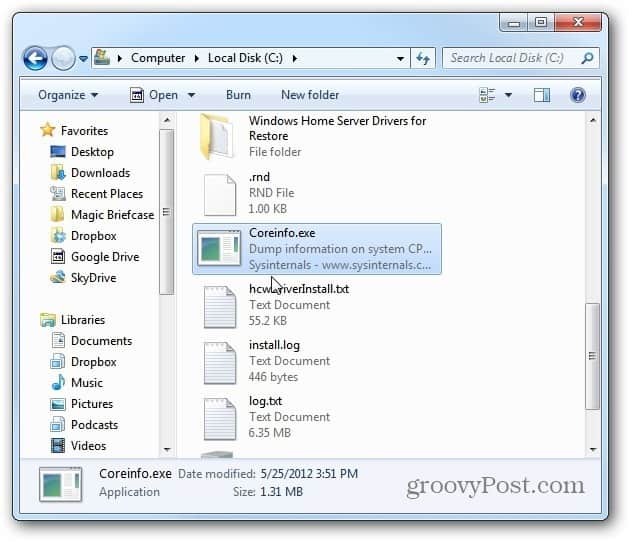

Next, go to Start >> All programs >> Accessories and right-click on Command Prompt, and select Run as Administrator.
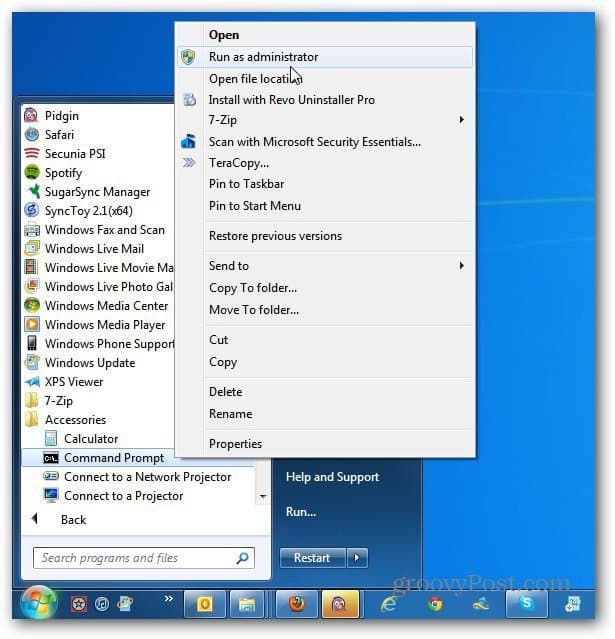

Now, in the command line type: cd c:\ when the C: prompt comes up type: coreinfo.exe –v
If you see an asterisk next to EPT (Extended Page Tables), you’re good to go. Your system supports Hyper-V.
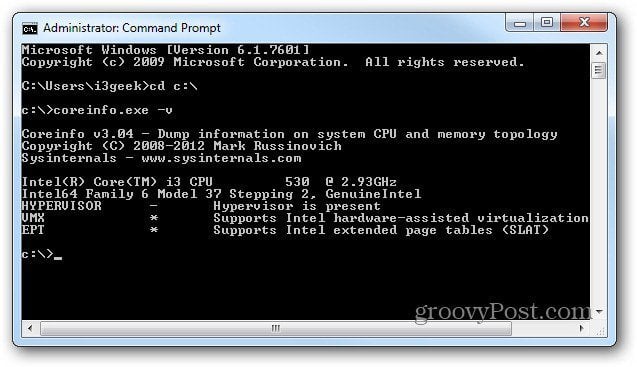

If you run CoreInfo on an AMD system – using the same commands as above, look for an asterisk on the NP (Nested Page Tables) line. On my AMD system, I have an AMD Athlon Dual Core CPU, and it doesn’t support SLAT.
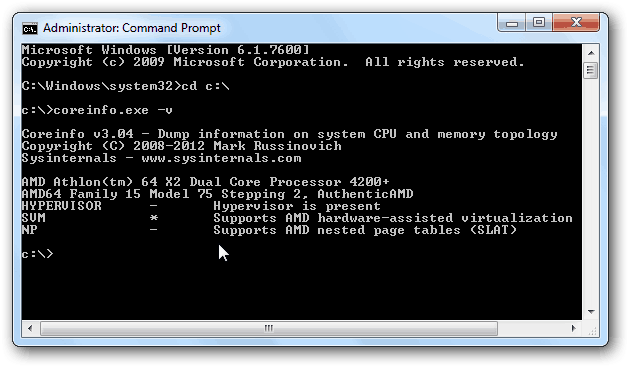

So again, you’re looking for an *, not a -. Here’s another Intel Processor that shows it doesn’t support SLAT technology. No Hyper-V for you!
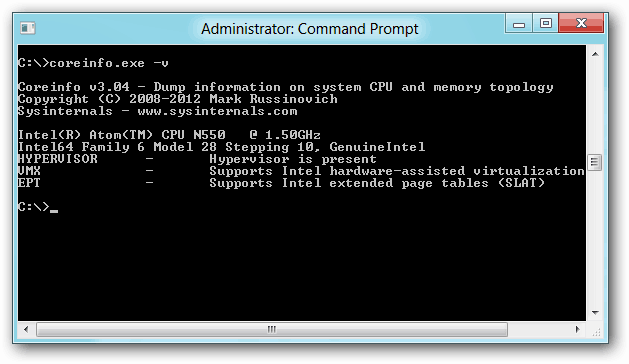

Intel Processor Identification Utility
Another option for users who have an Intel Processor is a free tool from Intel called the Intel Processor Identification Utility. Just like Coreinfo, it will tell you if your CPU supports SLAT or not. It’s also handy since it supports several languages other than English.
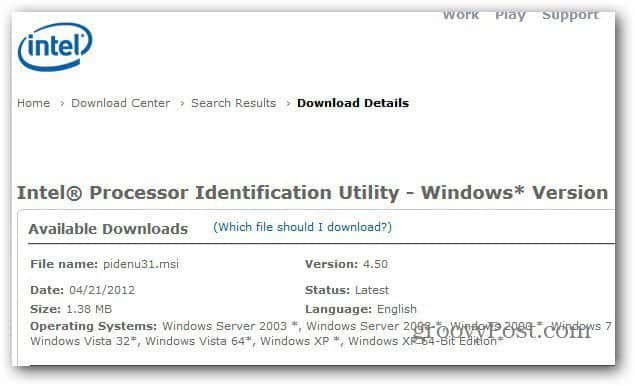

Installation is straightforward. Just follow the install wizard, then accept the EULA.
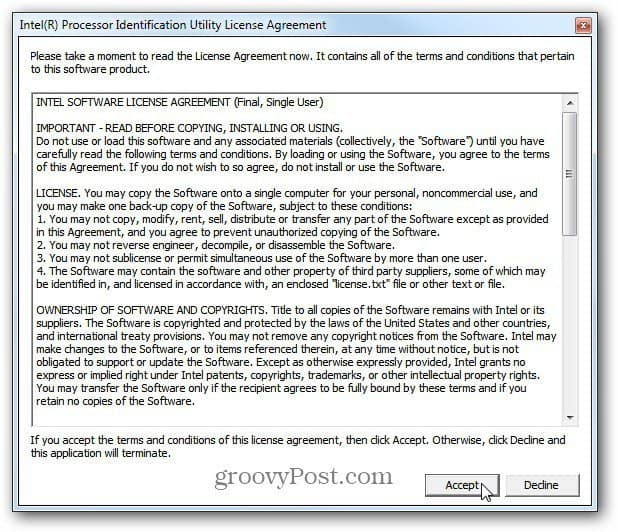

The utility will run and check out your system. Click the CPU Technologies tab at the top. If your processor supports SLAT, it will display Yes next to Intel VT-x with Extended Page Tables.
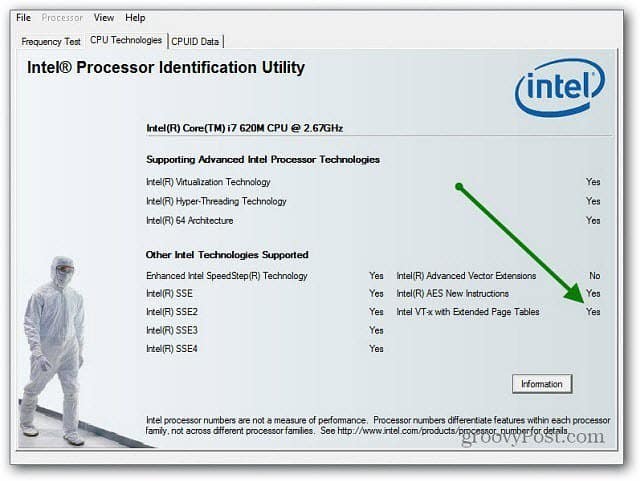

If you want to create and manage virtual machines on your Windows 8 system, you’ll want to determine if it supports SLAT and Hyper-V technology. Remember, just because your system can run XP Mode in Windows 7, it may not support Hyper-V in Windows 8.
7 Comments
Leave a Reply
Leave a Reply







Steve Krause
June 19, 2012 at 2:34 pm
Awesome read Brian and a MUST read for anyone playing with Windows 8 and looking to run a few virtual machines.
Brian
June 23, 2012 at 1:32 pm
Agreed. IT will need to do a heck of an upgrade on systems if they want to use it on a lot of machines.
Steve Krause
June 23, 2012 at 4:40 pm
How many systems in your home lab support SLAT @disqus_8H4zdmnIVx:disqus ? :)
Brian
June 26, 2012 at 10:59 pm
Only one…
Steve Krause
June 26, 2012 at 11:24 pm
Yeah same…. And unfortunately its not my test box!!! Grrr
Hardpoint IT
March 14, 2014 at 7:18 am
Very nice article. Encouraging to try both Windows 8 and Hyper-v.
Rich
December 28, 2015 at 7:11 am
Why does the Intel PIU tell me the CPU will handle Virtualization and Coreinfo tell me NO?